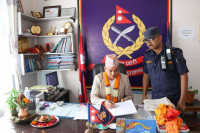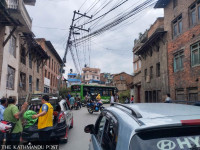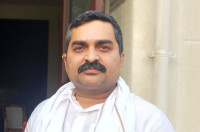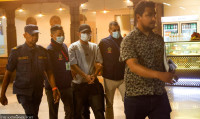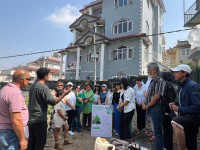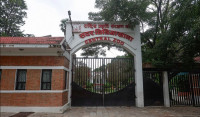Lalitpur
Lalitpur Metropolitan City organises public hearing, but without local participation
Many locals say they were not informed about the event..jpg&w=900&height=601)
Anup Ojha
Lalitpur Metropolitan City on Tuesday organised a public hearing programme at Ashok Hall in Patan Dhoka to listen to the grievances of the city residents. But the programme resembled a meeting of local representatives, where locals' participation was zero. Besides a handful of ward representatives, a few senior officials of the city, which included Mayor Chiri Babu Maharjan, Deputy Mayor Gita Satyal and Chief Administrative Officer Prem Prasad Bhattarai, there were no locals of Lalitpur at the meeting.
Many areas in the City are reeling from dozens of issues that range from dirty drinking water, faulty street lamps, inadequate sewage disposal, lack of public spaces and broken infrastructure crumbling from the after-effects of 2015 earthquake. The concerned locals, however, didn't get the chance to voice their grievances to their representatives, because they were not aware of the programme.
Chapter-2 of the Local Public Hearing Work Plan 2064 (2007) clearly states that public hearings should be held in an open space, where everyone can see and take part. But the programme was held indoors, and the locals were not even informed.
“I did not know about the programme,” said Sangina Maharjan, 39, a local of Bakhundole. “There are no street lamps in our area. We pay money to garbage collectors, but they do not come in time, and the roads are in poor condition. I don’t think the authorities are going to address our concerns through such programmes.”
Sangina believes the city officials deliberately did not inform the public about the public hearing programme to avoid criticism and backlash.
“If only the city authorities had made such announcement through Facebook or public notification, many residents would have shown up,” she said.
In the nearly two-hour-long programme, half the time was spent for a presentation by Accountability Initiative Private Limited, a consulting firm hired by the city, showcasing the positive works carried out by the city.
“The public hearing was held only for the city staffers, not for the public,” said Dhana Govinda Maharjan, coordinator of Swa Kowa Guthi. “Such programmes should be organised in a public place such as Patan Durbar Square, and the public should be informed about it.”
Dhana Govinda said he learned about the public hearing from one of the city officials.
“We are running out of funds in our Guthi to run jatras. We as a Guthiyar have been asking for Rs50,000 from the city office, but every time we present our letter, there is no response,” he said. “I would have raised this issue if I was aware of the programme earlier.”
Out of the 29 ward offices in the city, only a dozen ward representatives were present at the hearing.
“Why should such programmes be hosted in a closed hall? People should get a chance to raise questions, but I did not see anyone from the public,” said Ward-7 Chairperson Kul Bahadur Maharjan. When the Post approached some ward representatives and asked why they did not attend the programme, they responded that they too were invited on short notice.
The Public Hearing Act states that the local authority should make an announcement to the public regarding the hearing two weeks prior to the event.
“I got the invitation to the programme on Sunday only. It was on short notice, and we were confused about the programme and its schedule,” said Dinesh Karki, ward-24 chairperson.
When the Post questioned Mayor Chiri Babu, who was the chief guest at Tuesday’s event, regarding the zero participation of locals, he said it was the fault of the consulting firm, Accountability Initiative.
“I am also disappointed at not seeing any public at the programme. You better ask this question to Accountability Initiative’s Shesh Raman Neupane. This should not be repeated at the next public hearing,” Mayor Chiri Babu said.
Neupane, the consultant representative of city, said the notice of public hearing was aired via radio stations and also published in newspapers.
“If people do not come, what can we do?”




 13.12°C Kathmandu
13.12°C Kathmandu.jpg)
